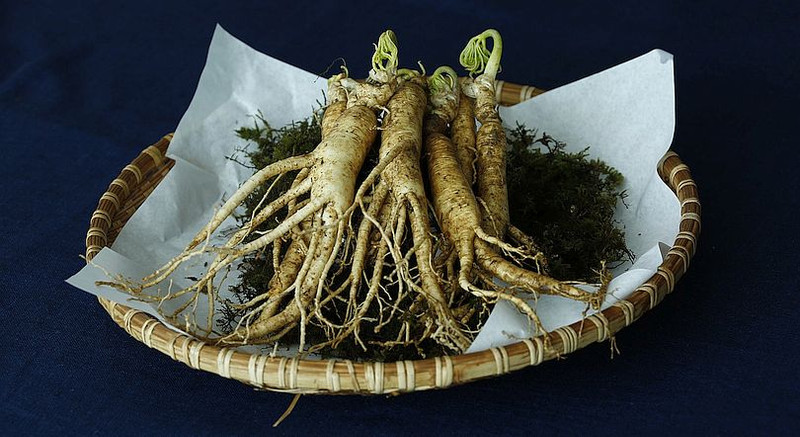Distinguishing one herb-based supplement from another can be tricky without a scorecard, although there are some herbs that need little explanation – except what you might see in the occasional nutritional blog, such as here – and it is in this category that ginseng distinguishes itself from most of the other herbs. What makes ginseng so popular and useful for people is that it can provide health benefits across a wide array of fronts. Perhaps your energy level has hit the skids recently. Ginseng can help. Got a weight issue accompanied by elevated blood pressure? Ginseng might be able to help kick start the metabolism while dropping the points off your BP, all while rejuvenating and even giving your sexual performance a kick in the pants when needed. Although there's still a fair amount of rigorous clinical research that needs to be done to fully test and verify ginseng's healthful attributes, there is much anecdotal evidence that this stuff works well, starting with the fact that it has been used for centuries in many parts of the world with positive results.
What is Ginseng?
Ginseng is a lightly colored, slow-growing plant with oval-shaped, green leaves and fleshy roots. It is most often found in parts of North America as well as in the cooler regions of Asia, per organicfacts.net, and it is available on the market in dried, whole, or sliced form. Now here's the real kicker – there are about a dozen different varieties of ginseng, with each having its own particular characteristics that make ginseng a staple among health-conscious people. Ginseng's key ingredient is ginsenosides, a chemical compound that provides the herb much of its medicinal benefits. Its other compounds include acidic polysaccharides, arginine, and polyacetylenes such as panaxynol and panaxydol. Per medicalnewstoday.com, both American ginseng, known as Panax quinquefolius, L., and Asian ginseng (P. Ginseng) have been thought to bolster energy, reduce blood sugar and cholesterol levels, and diminish stress while promoting relaxation, and yet that's only part of the story. Let's look at the rest of ginseng's story, focusing on how it might be able to benefit your health in numerous areas.Ginseng and Its Health Benefits
Ginseng's purported health benefits number more than a dozen, but here are eight that, taken together, show the all-encompassing power of ginseng to treat medical issues.- Anti-inflammatory. Per medicalnewstoday.com, ginsenosides might have an anti-inflammatory capacity in that it can reduce inflammation by targeting pathways in the immune system. This observation was borne out by experimental results published in the Journal of Translational Medicine.
- Strengthen immune system. Ginseng can serve as a defense mechanism against an assortment of microbial and bacterial infections – such as those associated with cold and flu – because of its anti-allergic, antimicrobial and antioxidant properties, per organicfacts.net.
- Lower blood sugar. With more clinical studies to be done, there has been some evidence that ginsenosides are capable of influencing insulin production in the pancreas while enhancing insulin resistance via other mechanisms, per medicalnewstoday.com.
- Boost energy. Per dailyhealthlifestyles.com, studies have demonstrated that the regular consumption of ginseng can ramp up energy levels while simultaneously reducing mental fatigue. Anecdotal evidence has indicated an ability of ginseng to counter annoying conditions such as fatigue, headaches, and memory issues.
- Enhance cognition. Here's how webmd.com puts it: There is some early evidence that ginseng might temporarily – and modestly – improve concentration and learning. In some studies of mental performance, ginseng has been combined with ginkgo.
- Relieve stress. Per the National Institutes of Health (NIH), panax ginseng has been shown to enhance some levels of calmness in healthy, young adults. This was based on a placebo-controlled, double-blind study involving thirty volunteers, average age 23. It was reasoned that adaptogens found in ginseng altered the body's hormonal levels, effectively treating chronic stress.
- Bolster sexual performance. Ginseng has long been thought of as an aphrodisiac in traditional Chinese medicine, particularly beneficial in treating erectile dysfunction with reports that it also has proved useful in raising sperm production as well as sexual performance and activity, per dailyhealthlifestyles.com.
- Alleviate menstrual discomfort. Because of its anti-inflammatory qualities, ginseng often has been used to treat women suffering from intense menstrual discomfort and cramps, while also alleviating mood swings, hot flashes and other symptoms normally associated with menstruation, per organicfacts.net.

